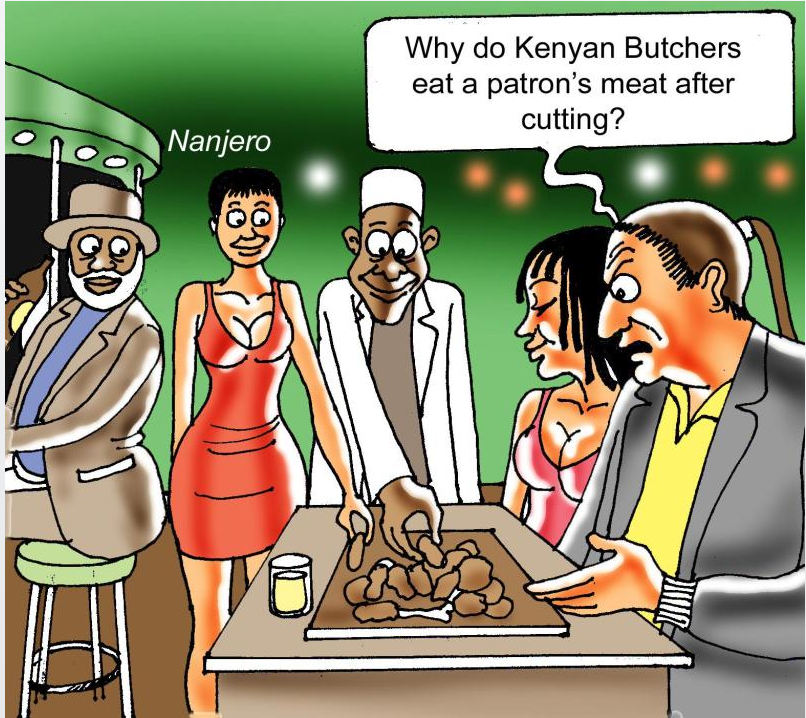Papa English is always amazed at the behaviour of Kenyans. One that puzzles him the most is the capacity of one person who is ‘sufficiently philanthropic’ throwing a round to all sots at the local. It never happens with odieros in his country where you carry your own ‘drinking cross,’ bills and all.
The other thing that amazes the man who confesses to farting first thing in the morning ‘kuji chamgamsha’ is the ndogogio capacity of most Kenyans. Papa English cannot absorb more than three beers, which he co-shares with Diameter, the political analyst.
But Kot-Kot can effortlessly swill 15 bottles and still recall the direction to his house to which he chapas many corners and dark alleys.
Papa English added another ‘peculiar’ behaviour of Kenyans when he ordered choma ribs which Waka-Knife, the resident butcher promised ‘ntazichoma kizungu in 45 minutes’ whatever that means.
Papa English wondered why all butcheries in Kenya prepare what Kang’ethe calls “ga-shoma” in 45 minutes “but funny thing is, it goes all the way past one hour and you will still be told to wait for five more minutes,” says Papa English shaking the pony tail on his mango head.
In his country, which Papa English has never named but Owish suspects is Kiribati, roast goat ribs are illegal.
Green mud
When the ‘ga-shoma’ for Papa English and Sister Lucy, his chain-smoking-veve-chewing girlfriend from Muchatha was ready, Waka-Knife cut it but salted the last piece on brown mbao, lifted his head, opened his mouth, and swallowed.
“Why do Kenyan butchers eat a patron’s meat after cutting?” Papa English asked Waka-Knife, who was wondering whether the ribs would go well with ugali or mukimo and ‘gashubari.’
Papa English rarely eats ugali which he considers “a tasteless lump of paste” while mukimo, the favourite of Sister Lucy, resembles green mud.
“The reason butchers eat the last piece or picks one randomly is to reassure the customer that it has not been poisoned… basically mzungu hatuja kuroga na choma!” explained Waka-Knife, picking another piece, tilting his head, opening his mouth that has produced very nasty world to those who run way with his kichwa-chemsha bills.
Nyambu, the bar girl with tu-Linda Ogutu, ambled from the counter and, without even asking, picked one rib, kimya kimya.
“Why do Kenyan counter girls attack a patron’s meat bila kuuliza and no one is bothered?’ posed Papa English like one re-examining the missing link to civilisation.
Kang’ethe advised Papa English ‘aache kuuliza maswali mengi kama ‘firithi’ (police)’ and try out mbuzi dry fry with mahindi chemsha and pili pili mbili kali from Kinangop for an idea why Kenyan butchers and bar maids hardly resist testing a hungry patron’s choma.
 The Standard Group Plc is a multi-media organization with investments in media
platforms spanning newspaper print
operations, television, radio broadcasting, digital and online services. The
Standard Group is recognized as a
leading multi-media house in Kenya with a key influence in matters of national and
international interest.
The Standard Group Plc is a multi-media organization with investments in media
platforms spanning newspaper print
operations, television, radio broadcasting, digital and online services. The
Standard Group is recognized as a
leading multi-media house in Kenya with a key influence in matters of national and
international interest.

